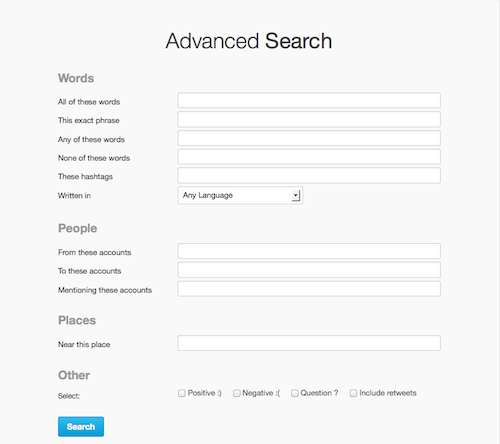 One thing you should know about me is that I’m a huge Twitter fan. And as much as I love The Google, I also really like – and use – Twitter’s built-in search functionality. Twitter in my world represents many great friends, conversation, learning, resources at my fingertips, daily laughs, content sharing, a robust content distribution network, stalking, err, new business prospecting—and much more. I told you I was a fan.
One thing you should know about me is that I’m a huge Twitter fan. And as much as I love The Google, I also really like – and use – Twitter’s built-in search functionality. Twitter in my world represents many great friends, conversation, learning, resources at my fingertips, daily laughs, content sharing, a robust content distribution network, stalking, err, new business prospecting—and much more. I told you I was a fan.
But I’m not so naïve as to think that just because I like a platform that everyone else does as well. Many people have mixed feelings about Twitter, some hate it, some find it completely without value, and some simply don’t have time to care. And that’s great. We can’t all like the same things, including the same social networks–-that would be boring. However, I regularly talk with clients (most of whom aren’t using Twitter and don’t have any idea what the platform is about other than “lunch”), and after we talk a little about the benefits to be realized, many change their minds.
So I thought that info might be helpful to you as well. Even if you’re not participating in the Twitter stream on a regular basis, you should know that the site is a valuable source of information— real time news, industry specific content, discussions and chats on a wide variety of topics, and real time consumer feedback and online help desk.
How to Use Twitter Search
If you’re in the market for information on a particular topic or group of people, think about adding Twitter to your search repertoire. It’s also a great source of information if you’re in the midst of a competitive analysis or want to keep tabs on a specific industry.
The most common way to search Twitter is to use the twitter.com/search URL. And although this works, it’s a little too basic and doesn’t allow you to set any additional parameters aside from your search term.
Instead, our team recommends using the Advanced Search feature, pictured below. You can either access Advanced Search from the URL https://twitter.com/#!/search-advanced or pick the “Advanced” option that appears under the standard Twitter search bar.
As you can see, the advanced function gives you a lot more options for customization and the ability to search not just words, but people and places, too. Plus, you can specify either positive or negative sentiments, questions and retweets, which will help you better refine your results depending on what you’re looking for.
Even if you’re already monitoring certain keywords phrases or hashtags, you may find an occasional advanced search will help you cut through the noise and more easily pinpoint certain types of information. After all, Twitter moves fast, and there’s a lot of content to sift through. Making a habit of using advanced Twitter search won’t just help you more easily find what you’re looking for, but it will save you time, too.
Other Keyword Search and Monitoring Tricks
Twitter search is a tool we use a great deal—for ourselves and for our clients. We also use some tools for keyword alerts and real time monitoring and thought a nod to those might come in handy. One of our favorite keyword alert tools is SocialOomph, which we use pretty much daily. Using SocialOomph you can have keyword alerts delivered to your inbox and that helps us in a number of ways. Brand reputation management, influencer identification, customer service – you name it.
If you’re interested in some additional keyword search tools, you can check out this post: 7 Keyword Search Tools for Twitter, which reviews and evaluates several tools for not only keyword searching but also for real time Twitter monitoring.
What Do You Think?
Have you used Twitter’s advanced search feature? What do you think of the functionality as compared to the original search option? Do you have other tools that are your go-to tools? If so, do share.
Oh, and while we’re on the subject, feel free to stalk me on Twitter (I’m @ShellyKramer) if we’re not already pals. I’m way more interesting than that Ann Handley [running].
This post originally appeared on the MarketingProfs Daily Fix Blog
Image by kennymatic via Creative Commons
